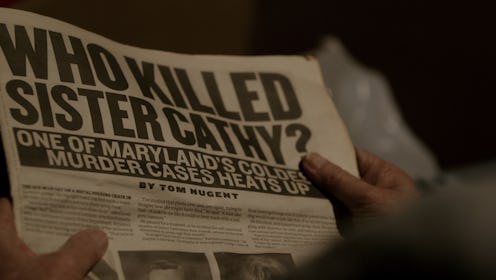
Five decades after the murder of Sister Cathy Cesnik, The Keepers has hurled the cold case back into the national spotlight. The nun was killed in 1969, her body found in 1970, and her assailant never formally identified. The investigation has persisted, but information has been sparse throughout the intervening years. Now, just as Keepers debuts on Netflix, updates in the Sister Cathy murder case carry things right up to 2017.
The first big break came in 1994, when two women, Jean Wehner and Teresa Lancaster, filed a civil lawsuit containing details they believed were tied to Cesnik's death. While she was alive, Cesnik had worked at Archbishop Keough, an all-girls Catholic high school in Baltimore where Wehner and Lancaster had been students. The women claimed Keough's chaplain, Father Joseph Maskell, had sexually abused them repeatedly throughout their years at the school, and that Cesnik had been murdered to cover up his behavior. Wehner alleged that at one point, Maskell even took her to see Cesnik's body, purportedly telling her, it was "what happens when you say bad things about people."
Regarding the renewed interest in the theory that Cesnik was murdered because she knew of Maskell's alleged abuse, the Archiocese of Baltimore released the following statement on its website:
In 1994, the Archdiocese and Metro Crime Stoppers offered a $6,000 reward leading to the arrest/conviction of Sr. Cathy’s killer. The Archdiocese cooperated fully with authorities investigating her murder and continue to offer full support for efforts to solve her murder.
According to the Baltimore City Paper, more than 30 men and women have since come forward with first and secondhand stories of the abuse.(Maskell denied the sexual assault accusations until his death in 2001, and he was never charged in connection to Cesnik's case.) Wehner and Lancaster's lawsuit was dismissed in 1995. It had hinged heavily upon recovered memories — a controversial concept at the time — and the judge ruled that they could not restart Maryland's three-year statute of limitations.
Until recently, news on the investigation had largely dwindled. Earlier this month, CNN reported that Baltimore County Police had exhumed Maskell's body. According to the outlet, they took samples from the corpse in February to check against a DNA profile developed from evidence taken in 1970, when Cesnik's body was discovered. Elise Armacost, director of public affairs for the Baltimore County Police, told CNN that police have compared the DNA of several other people to the 1970 profile, but those tests did not match.
On Wednesday, the Baltimore Sun reported that the DNA sample taken from Maskell did not match their 1970 profile, and he has been excluded as a contributor from the scene.
According to The Washington Post, Armacost said that police have been working actively on Cesnik's case for the past four years, in part because of continuing tips about sexual abuse claims against Maskell, but that the timing of the exhumation of his body was not related to The Keepers. She also told the outlet that police are pursuing alternative leads, such as whether Cesnik’s murder is related to three other young women — Grace Montanye, Joyce Malecki, and Pamela Conyers — who were killed in the Baltimore area during the time. They were all last seen at shopping centers, as Cesnik was.
Armacost told the Baltimore Sun that, for now, police had reached the end of the road when it comes to forensic evidence, and were looking to witnesses who were still alive as their best hope for solving the case.